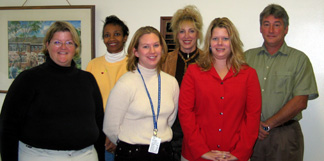 |
Members of the Munroe-Meyer Institute’s social work department are, back row from left to right, Anita Lee, Deb Reay, and John Harris. Front row: Patti Cole, Debbie Priefert, Cindi Jeffrey. |
The program, which started in October 2002, allows high school students to assist children ages 3 to 21 with developmental disabilities. Participants develop a better understanding of disabilities and how to interact with those who are disabled.
The program is a collaborative effort between UNMC’s Munroe-Meyer Institute’s Social Work Department, the Nebraska Center on Disabilities, Westside Community Schools, The Eastern Nebraska Community Office of Retardation and Developmental Disabilities (ENCOR), the Ollie Webb Center. It is funded by the Administration on Developmental Disabilities and the United States Department of Health and Human Services.
“There are only four of these projects funded in the U.S,” said Anita Lee, project coordinator of Doing GREAT.
Schools participating in Doing GREAT
Currently, two Omaha schools, Westside High School and Mercy High School, are involved in the program. Deborah Reay, the program’s project director, recently learned the program has been renewed for a second year. As a result, it will be expanded to Ralston High School.
“Right now we have 85 students in the program, but the grant requires 100,” Lee said.
Breaking stereotypes
Students accepted into the program must attend at least an hour of training, Lee said. “The training helps break stereotypes and misconceptions and makes the students realize the kids have emotions,” Lee said.
In a pre-training survey, students share their knowledge and opinions of individuals with developmental disabilities. A post-survey is completed after they have completed their training and participated in an activity. Student volunteers assist in planning such activities as dances for Valentine’s Day and summer luaus. The volunteers also help with after-school and Saturday activities.
Building bridges
Program coordinators have received positive feedback. “Parents are surprised that their kids are interested,” Lee said.
The program benefits all students, said Mercy High School Principal Carolyn Jaworski. “It’s wonderful that we were able to form a partnership with UNMC and that the girls were able to give to others,” she said. “At the same time, it gives them a chance to do career exploration.”
Students at Westside High have gone beyond the required program and created a Doing Great club at their school. Lee hopes the program builds a bridge between the student volunteers and children with developmental disabilities. “I hope when they see children in wheelchairs that they aren’t afraid to work with them or invite them to have lunch with them because they’re just like everyone else,” she said.